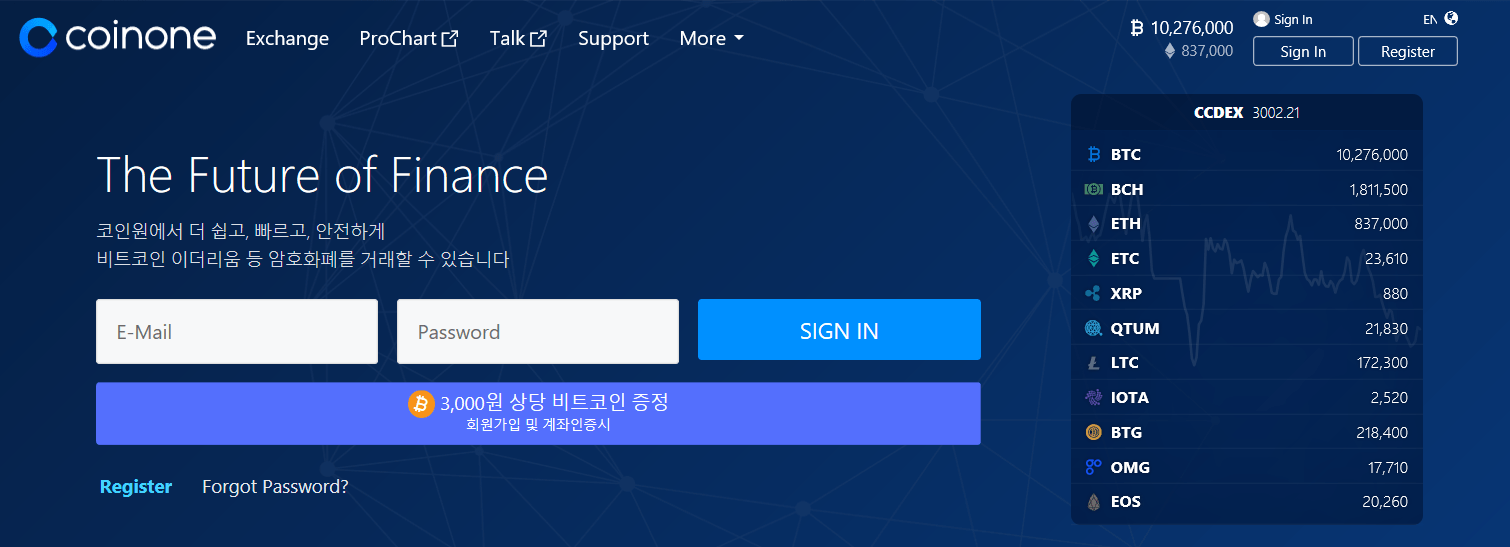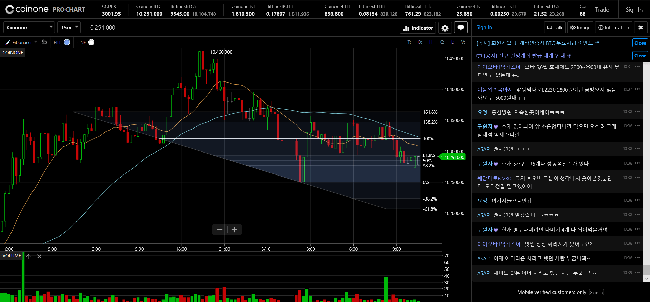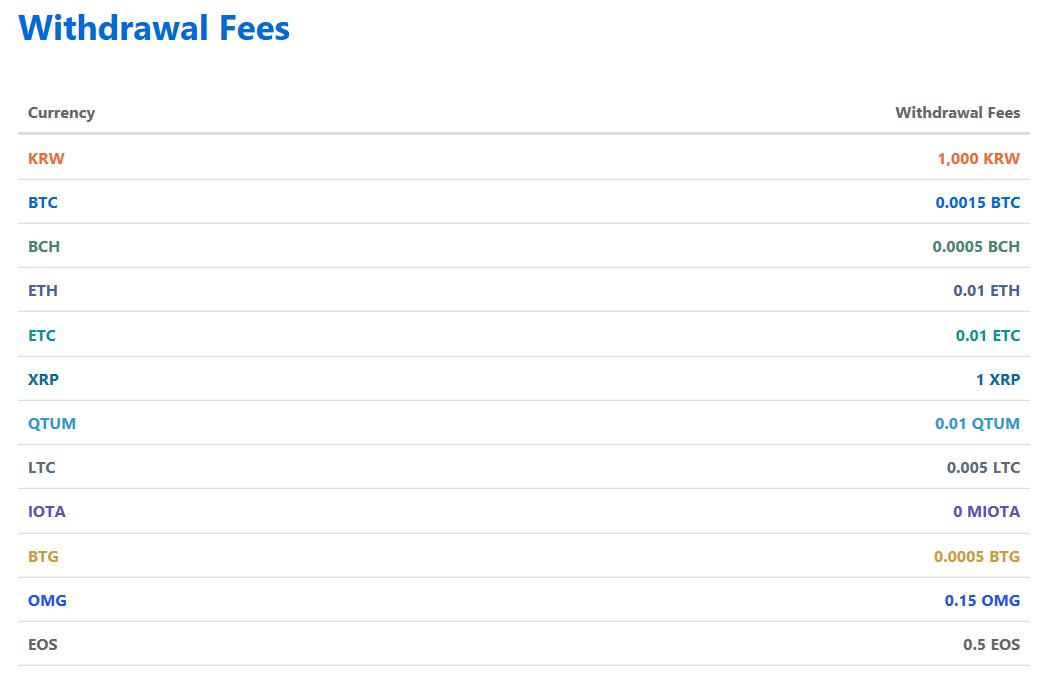Coinone is a South Korean cryptocurrency exchange, and was established in 2014 by founder and current CEO Myunghun Cha. The site was officially launched in 2015, and while it was once one of the top 10 global exchanges, it is currently ranked #41 in trading volume. While crpytocurrencies continue to increase in visibility and popularity, especially in South Korea, the rise of so many new and innovative exchanges has cut into the Coinone trading volume.
Previously Coinone was also the second largest South Korean exchange, with only Bithumb topping it, but the new Upbit exchange also has more trading volume now, putting Coinone solidly into the third position among South Korean exchanges. As of May 2018 Coinone has roughly $50 million in daily trading volume, but Upbit sees over $500 million exchanged daily, while Bithumb is nearly $750 million in daily trade volume.

About Coinone
Coinone was created with a vision to make cryptocurrency exchanges easy to use, with simple user-friendly design. Mr. Cha focused on building a cryptocurrency exchange for the masses to be able to buy and sell. And even though the focus at Coinone was on simplicity and ease of use, the exchange still came up with some innovative and unique features.
Coinone began as a Bitcoin only exchange, but as the cryptocurrency markets grew they saw the need to add other coins, and currently you are able to buy and sell Qtum, Litecoin, Ripple, Ethereum, Ethereum Classic, Bitcoin Cash, Bitcoin Gold, and IOTA on this exchange, in addition to the original Bitcoin of course.
One thing that needs to be noted here is that like its competitor Bithumb, the Coinone exchange is primarily focused on the Korean market. Yes the website is available in English, and English speaking nationals are not prohibited from creating accounts and trading, but the only fiat currency that can be deposited and withdrawn is the South Korean Won (KRW). And, it isn’t possible to trade cryptocurrency crosses such as BTC/ETH, instead all cryptocurrencies are traded only against the KRW. This certainly puts Coinone at a global disadvantage, and we’re not sure why they’ve chosen not to include the major currencies as an additional option.
Keep this above information in mind, because if you aren’t residing in South Korea you’ll be better off finding an exchange that is better suited to you. It is not possible currently to make deposits and withdrawals from any bank account outside South Korea, so even if you could get through the verification procedure (which also requires some documents that almost demand South Korean residency), you’d likely be unable to make a deposit or withdrawal unless you somehow have a bank account at a South Korean bank.
That said, there are advantages to trading with Coinone, so let’s take a look at those first, and later we’ll look at some disadvantages.
Coinone Trading Advantages
This list may not be all-inclusive, but it includes the top advantages I can see for trading through the Coinone exchange.
- Coinone is a very secure exchange. Cryptocurrencies always pose the risk of loss or hacking thefts, so security is always of paramount importance when choosing an exchange. Coinone can say it has never been hacked, something that isn’t true for its competitor Bithumb. And it uses cold storage for all client coins, keeping them offline to add security. And for account level security the exchange offers multi-signature and 2 factor authentication.
- Well established cryptocurrency exchange. Having been register in 2014 and launched in 2015 the Coinone exchange is a well established exchange, with a good track record. In the four years of its existence there haven’t been any hacks or security breaches, and there have been no allegations of scams or fraud. Overall the Coinone exchange can be considered trustworthy and secure.
- Low fees. One of the great attractions of Coinone over the years has been the low fees charged by the exchange. Every little bit helps when you’re trading and investing, so why not save on exchange fees when possible. Frequent traders with large trade volume benefit even more as the exchange has a sliding fee scale that lowers fees the greater your trading volume. You won’t find lower fees on most exchanges, so if you’re the frugal type who doesn’t appreciate the high fees being charged at some cryptocurrency exchanges you can benefit from Coinone’s low fee structure.
- No deposit fees. While some cryptocurrency exchanges do charge deposit fees when you’re depositing fiat currencies, Coinone sticks to its low fee structure by avoiding deposit fees completely. Of course you still need to have a South Korean bank account and deposit in South Korean Won, but if you can do that you can avoid exchange deposit fees. Note that any bank fees would still apply.
- Coinone accepts fiat money. One great advantage to using Coinone is the fact that they accept fiat currency. Granted it’s only South Korean Won at the moment, but we can hope they expand this in the future to include Yen, Euro and U.S. dollar deposits. Anyway, accepting fiat deposits puts Coinone ahead of most cryptocurrency exchanges who will only accept other cryptocurrencies for deposit. Big plus for Coinone.
- Coinone supports trading multiple cryptocurrencies. Even though Coinone began as a Bitcoin only exchange, it realized the need to accept other coins as well, and has been growing alongside the overall growth in cryptocurrency markets. Currently you can trade Ethereum, Ethereum Classic, Bitcoin, Bitcoin Gold, Bitcoin Cash, IOTA, Ripple, Qtum, and Litecoin at Coinone. This is good, but with some exchanges offering over 100 different cryptocurrencies, Coinone may want to focus on expanding its stable of available coins.
- A user-friendly trading interface. The Coinone interface has been built specifically for ease of use, and user-friendliness. While I think the exchange has met this goal, a complete beginner might hae some problems figuring out how to trade. Overall however I have to say the platform and interface is quite intuitive. Coinone has additionally added features for advanced traders, and their “Pro Charts” are really quite good, even if you’re an experienced trader.
- Coinone offers leverage trading. While more exchanges are getting on board with this, finding leveraged rading is still somewhat rare among cryptocurrency exchanges. Coinone offers traders the ability to trade with leverage up to 1:4, which isn’t huge, but still gives some advantage. I wasn’t able to find the fee structure for borrowing on margin, but considering the focus on low fees at Coinone we can guess that fees are in the average to low range. Just be careful if you choose to use leverage as it is an advanced trading technique and comes with high risks in addition to the potentially high rewards.
Coinone Trading Disadvantages
Even with all the positives that Coinone has going for it, there are still some downsides that we’ll want to take a look at. Nothing is perfect, and by looking at the negatives we can get a complete picture of the type of trading experience you can expect from Coinone. So, here are the downsides to trading with Coinone:
- Coinone only offers South Korean won (KRW) pairs. As I mentioned above, you can only trade cryptocurrencies against the South Korean Won on the Coinone exchange. I think this is the biggest disadvantage of the exchange. They really should expand and offer trading against other fiat currencies, or at least allow trading in one crypto against another.
- Coinone is too focused on the South Korean market. This ties in with the disadvantage noted above, but it goes even deeper than that. If you want to trade at Coinone you need to have a South Korean bank account for deposits and withdrawals. And while the website is available in English, it isn’t completely transalated, so you should probably know how to read Korean if you’re thinking of trading through Coinone. Expanding outside South Korea could provide the exchange with great growth opportunities.
- Coinone charges withdrawal fees. Low fees are one of the hallmarks of Coinone, and to be honest the withdrawal fees they charge are also low, but I wish they would just forego the withdrawal fees completely. In their defense, these types of withdrawal fees seem to be fairly standard for the cryptocurrency industry.
- Negative reviews about Coinone. Because Coinone focuses so heavily on the South Korean market it isn’t easy to find English language reviews of the exchange, but there are some out there. The most common complaint seems to revolve around slow withdrawal processing. I can’t be certain, but this might be due to security practices in place at Coinone, but you should be aware of the possibility of withdrawal delays based on reviews of the exchange.
Coinone Fees
As I’ve mentioned above, the Coinone exchange is quite well-known for having low fees. In fact, it is one of the really strong suits of the exchange. There are no deposit fees, but there are trading fees and withdrawal fees to consider.
Let’s first look at the trading fees at Coinone, as these are the ones you’ll likely encounter the most. Like most cryptocurrency exchanges these days, Coinone has both maker fees and taker fees. Makers are those who are buying and selling and creating liquidity on the exchange, and they typically enjoy the lowest fees. Takers are the ones who satisfy a buy or sell order, thus decreasing exchange liquidity.
As you can see below, makers are able to lower their fees from a maximum of 0.1% to a low of 0%. Taker fees begin at 0.1% as well, but only go as low as 0.02%. Below is the complete fee chart:
Withdrawal fees are also charged by the exchange and these depend on the currency or crpytocurrency being withdrawn. Currently withdrawals in fiat currency is charged a 1,000 Won fee (about $0.94), while Bitcoin withdrawals are 0.0015 BTC (about $14.00).
Coinone Customer Support
Online reviews indicate that Coinone customer support is adequate, and Coinone has even added a live chat feature recently, which I feel is cutting edge for cryptocurrency exchange customer support. You can also reach the Coinone customer support by calling onto the following phone number: 1670-9756. If the phone line is busy, you can also reach out to the support team by sending an email to support@coinone.co.kr.
In Conclusion
Coinone looks like a very nice little exchange. They are well established, seemingly secure, and take customer service seriously. In addition, they have a very nice interface, and the Pro Chart feature is even good enough for the professional trader. And the low fees can’t be beat at most exchanges. By all accounts from online reviews, Coinone clients have been quite pleased with the service they receive. As an added plus, users can take advantage of leverage to boost their returns.
However, if you aren’t a resident of South Korea the disadvantages not only outweigh the advantages, but basically make this exchange unusable. The lack of support for anything outside South Korea in terms of banking and verification means most global users will not be able to make deposits, or get the identity verification necessary to make withdrawals.
If Coinone decides to drop the focus on South Korean traders and expand globally it will be an exchange worth trying, but for the time being it’s better avoided if you aren’t South Korean.


